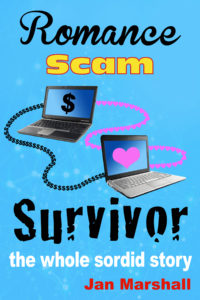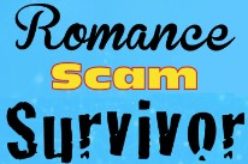Its just over 5 years since I was scammed, and the third anniversary of my blog is on February 10, when I published my first post with my purpose and mission for this Blog. The most important issues I have covered since then in my blog are summarised here.

Since I started my blog 3 years ago I have posted 30 mini essays on topics about how scams work, its impact on victims, how law enforcement responds, the ongoing statistics, and recent books and research. As well, my site now has 11 different pages, including one which lists the many instances I have been interviewed for TV, Radio, Magazine and Podcasts.
This Media Presence page does not include the times I have spoken to victims, because no-one understands what its like except someone who has gone through the same thing. It does not include the times I have spoken to people who have a relative or friend they think is being scammed and want to know how to get through to them and stop it. It does not include the public speaking I have done at eg. PROBUS clubs, or libraries across my local network.
At the same time as starting the blog, I set up a Meetup Group in Melbourne for people affected by scams. Initially it drew many people out of the woodwork, and I ran multiple groups over a number of months. Then gradually the numbers died down again, to a steady trickle of victims looking for support.
Of the most important issues I have covered in my blog have been:
1. Shame

Understanding that feelings of shame cause people to close off, shut down, and be secretive, and that this ultimately leads to becoming numb and dead as a person. Understanding this allowed me to have the courage speak up and speak out about what happened, because I did not want to be dead and closed off inside myself. The work of Nicholas de Castella and Brené Brown were instrumental in developing my understanding of this area. See the list of blogs on this topic below.
More recently the concept of ‘victim blaming’ has come to the fore in our understanding and language. It has highlighted that shame and embarrassment, which might have been thought to be coming from inside a person, are influenced and perhaps fed by the attribution of blame coming from outside the person, from beliefs of segments of the society in general. If blaming and shaming is done by someone who is not trusted, and who does not understands the context, then it can and does become vicious, demeaning, hurtful and damaging, and promotes feelings of shame.
I have found that by standing in and expressing my own truth as I understand it, and at the same time admitting that I made mistakes, I can deflect and direct that blame to where it truly and rightfully sits, with the criminal perpetrators of cyber fraud. They are in the wrong. Not me. Proclaiming this has enabled me to stand strongly in myself with my self respect intact.
2. Understanding how scams work
One of the most important understandings about scams came via a newspaper

article which interviewed an ex – scammer. In this he talked about the strategy they had of “taking the brain”, and how they methodically and deliberately sought to get people to fall in love, because once in that state, they knew they had control of them. They knew that they could do and ask anything, and they would be believed and supported.
The exercise of love-bombing until a successful state of ‘taking the brain’ is achieved is, from my experience, the foundation of the altered state that many scam victims find themselves in. This exercise has been honed by tried and tested scripts of emails, conversations, actions that the scammers know will work. When in this altered state victims do things outside their normal rational self, and go to lengths that are self-damaging, illegal, detrimental to their future, though they do not believe so at the time. They will sell anything and everything they have to give money to their scammer, they push friends and relatives away, in the belief that their scammer is their only true love and they can provide whatever they will need for their future. In reality, the relationship is based on lies, effectively delivered by very skilled emotional manipulators who know what works.
The hardest part, and one that still challenges me today, is to know how, when contacted by relatives of victims, to break through this altered state to reach the victim. Because of the trust the victim has in their scammer, its very difficult to reach the victim to have them understand they are being scammed. There is no ready answer that I have found to this conundrum.
3. No recourse against the scammer
The third element is to understand that once scammed there is little or no recourse for the victim. Though reporting is encouraged, little action by police or law enforcement seems to follow on from this. Scammers seem to be able to act with impunity, and most likely choose victims from countries where they know this is the case, and operate in countries/jurisdictions where they know there is no legal mutual obligation and no prisoner exchange treaty. Whereas good private investigators can follow the online trail, and can sometimes identify the scammer, little is done to apprehend them. And because no legal action against the fraud is taken, no support for victims as ‘victims of crimes’ is available.
In our country we believe the legal system will support us when things go blatantly wrong, and from personal experience, when this does not happen, it breeds hopelessness and depression. Doubly, it does not provide any antidote to the victim blaming that occurs, but rather, reinforces it. This on top of the emotional grief, and the devastation of the financial losses is a hard road for many victims and it takes years to recover.

A recent report by Scamwatch show that in Australia for December 2017 only , of the 244 reports made about romance scams 26% reported financial losses totaling $1,233,582. Most of this was by those over 55 years old. And we know reporting levels may be as low as 10% of what is actually happening. This is having a huge impact across the nation.
In recent times, perhaps in reaction to the immense losses that have been occurring Australia and across the world due to scamming, some positive changes have occurred. These include:
- Western Union and MoneyGram (in USA) agreeing that their system has facilitated scammers. They have been required to put funds aside to recompense victims.
- Organisations like the ACCC working closely with the Australian banks and money transfer agencies to ensure there is appropriate training of staff to recognise the countries being used, and to be able to identify the payment patterns of people and when the pattern might indicate a scam. They can then hold the payment and contact the person in question. The ACCC are also working with organisations like Facebook to better identify fake profiles.[1]
- USA has successfully extradited scammers from Nigeria and prosecuted them.
These improvements must continue. Only by people continuing to report what happens to eg ACORN can the areas or countries be identified. People at risk can be then be categorised and prevention messages made more specific to different groups of people.
The prevention message is getting more refined[1]. Eg.:
- If you are being asked to make a wire transfer it’s a scam. Its that simple.
- If you are connecting with others online, meet them as soon as possible and if they have excuses, move on, its probably a scam.
- If you are connecting with others online, get your friends involved as well, so they can provide some balance and perspective to what’s happening and raise warnings that you might not see. Listen to them.
Lastly, as part of my anniversary of my blog, to quote Dr Cassandra Cross,
“People cope differently from this experience: some are angry, some are depressed, some talk of suicide, while others spend every waking hour trying to figure out how they were scammed and try to prevent it happening to others.” [2]

I am definitely one of those who try and figure out how they were scammed and try and prevent it for others. I hope you have found my blog of value to you and your friends over the past three years.
Read the full story of what actually happened to me, and how I recovered and became a survivor in my new book Romance Scam Survivor: the whole sordid story.
Key Blogs in the Archive:
- Shame: The power of speaking out plus The shame of being scammed and Beyond the Shame.
- Victim blaming: Victim Blaming endemic in Romance Scams
- Taking the Brain: Taking the brain…
- Police response: Police are not doing enough about scams
[1] Delia Rickard on The Money: 171214:1730 The Economics of Scams ABC Radio Nation Program. Well worth a listen.
[2] Dr Cassandra Cross, Lecturer in Criminology at QUT Love Hurts: the costly reality of online romance fraud The Conversation 11 December 2014


Hallo Jan,
ich spreche leider nur deutsch,
Mit diesen Typen von dem du da gerade sprichst, bei mir heisst er Paul Edward-kommuniziere ich gerade. Bin leider auch auf ihn hereingefallen. Er wird schön wütend, wenn ich nicht die nächsten 5000€ zahle, damit sein Paket von Italien nach Deutschland, zu mir geliefert werden kann.(lach..)
Es ist wirklich gruselig, was es für furchtbare Menschen gibt.
Dabei sieht er ja auf dem Foto ganz nett aus- gar nicht wie ein Betrüger.
An welche stelle wendet man sich denn: Polizei?, Zoll? auswärtiges Amt?
Ich freue mich, von Dir zu hören
LG
Uta
Uta, firstly break off all contact with this person. Secondly, there is mostly an organization which deals with scams in the country you are in. Contact them. Local police are also good to contact, but they may not help much. All the best with it.
I feel like I am being scam now on kik
He talks to me, I talk to him I feel something is wrong. I am scared. What do I do. Cancel the kik app an report it some how. I am a shame an sick with fear.
If you have any sense that it may be a scam it most likely is. Trust your sense of this. Report it to whichever organisation is appropriate for your country.
Jan,
First I wanted to say I’m terribly sorry to hear this has happened to you. I can’t imagine the pain, but at least you’ve been able to work thru and bring light to what is happening. Not easy I’m sure.
Unfortunately, my family & I are living thru this with my mother. She was lured into a romantic scam by a 27 year old Nigerian who goes by the name of “One” a few months ago. She became secretive with her budding relationship. We literally snuck away in the middle of the night last Friday to run away to Nigeria & marry her one true love. All BS of course. She is 73.
I really need help knowing what to do and when. Any thoughts? I’d honestly appreciate anything.
Thanks, Tisa
Hi Tisa, these are very difficult situations and there is no easy answer. I suggest you go to the police, whoever deals with scams in your country, and/or your foreign affairs department to ask for assistance. All the best with this. Jan.
The romance scammer may have wrongfully taken your money but didn’t take your inherent value. Thank you for being so honest and speaking out publicly so that other people might recognise they are being scammed and get out before it’s too late, and yet others have somewhere to go where they can be supported.
You are the phoenix arising from the ashes of disaster, resilient, dignified and strong. Kudos to you, Jan.